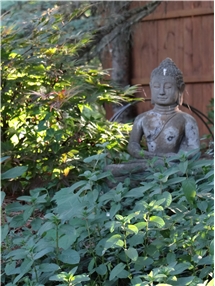Plague Journal, The Officers Looked On

We had our philosophy discussion last night, six of us using one of the online video chat tools. The question of the evening: Is goodness natural? Certainly we could have wrestled with the definition of each of those terms.
I have thought about this question in its many variants for years. The three words could be inscribed over the archway of the Capitol building, or of the Supreme Court. Perhaps these three words could be to us as were the three words inscribed on the portico of the temple of Apollo at Delphi, Nothing in excess.
As you can imagine we had interesting exchange of ideas about whether we humans are inclined toward goodness, a natural bent. What happens to us quite early on as we learn language and are introduced into the human world of culture? Culture is a world, and there are many distinct worlds on this planet. Cultures are the inheritance of the past, acts and purposes of our progenitors, We maintain the culture of our place and time quite unconsciously by our participation in institutions and practices.
Described so abstractly, this sounds benign. It is anything but benign, as we all know, in our moments of solitude, when we are able to hear our inner voice. Culture is many things, and there is no denying that culture is a matrix of power relationships, expressed directly in political terms, and indirectly in economic terms. There are winners and losers The social hierarchy of our society designates who are winners and who are the losers. Ginia Bellafante writing for the New York Times expresses the matter succinctly.
…there are “right people” and wrong people, a determination made by birthright. There are the rich, and there are the dismissible; the great looking and the condemned — a paradigm that has become dangerously untenable…
— excerpt, Can Anna Wintour Survive the Reckoning? June 14 NYT
Our discussion on the status of goodness migrated toward the reality of American society, the fault line between winners and the losers, which is often along racial lines. We agreed upon the difficulty to be acquainted with anyone of another cultural heritage, or racial background on account of the geographical separation and concentration of communities due to income disparity. People of color, no matter their qualifications, do not have equal access to the better paying jobs. I would need to drive for twenty minutes to encounter a community of non-white citizens. The physical and economic separation stands in the way of a more fair society, the cultivation of goodness as the rule in our relationships with one another.
Several days ago I was shaken by the report of two young black men dying, their bodies were found out of doors, hanging. Their deaths were ruled a suicide. That is just too convenient at this time, to be a coincidence. A Black person hanging themselves?! Really?
It is possible that I could be wrong.
Here is a quotation from the Los Angles Times piece:
“The explanation of suicide does not seem plausible,” the family wrote. “There are many ways to die, but considering the current racial tension, a Black man hanging himself from a tree definitely doesn’t sit well with us right now.
“We want justice, not comfortable excuses,” they wrote.
— The family of Malcom Harsh, Harsh was 38
The officers looked on.
To read the entire LA Times article CLICK HERE.
3 thoughts on “Plague Journal, The Officers Looked On”
“Culture is a World.” Very profound. The question becomes, how willing are we to truly attempt to see other worlds? I’m reading “12 Rules for Life,” by Jordan Petersen. In it he suggests Totalitarianism is when we see only our view of the world as correct and perfect. It is only when we are willing to be wrong about our world that we can grow and become something more.
There are many cultures, as their are forms of life/life-worlds. I do not think that we can “see” another world from the outside. Observation of another world from the vantage point of our own, the norms and meaning that are native to us — results in confusion, due to our inability to grasp the internal logic that another lives by. Yet, when we are invited into “that” world with some coaching things start to make sense. Stay there long enough, and many things make sense. That’s work though. And sometimes we find, and you state, things are wrong about our world.
Thanks for provocative comments!
You have an uncanny knack for finding music most apropos. I’m waiting for Hank Williams or George Jones.
Blessings